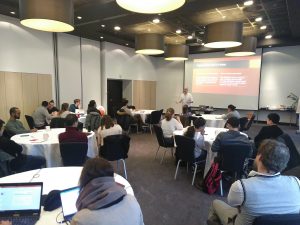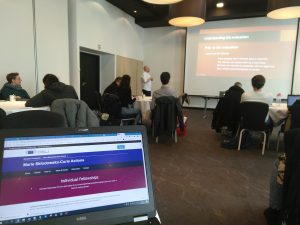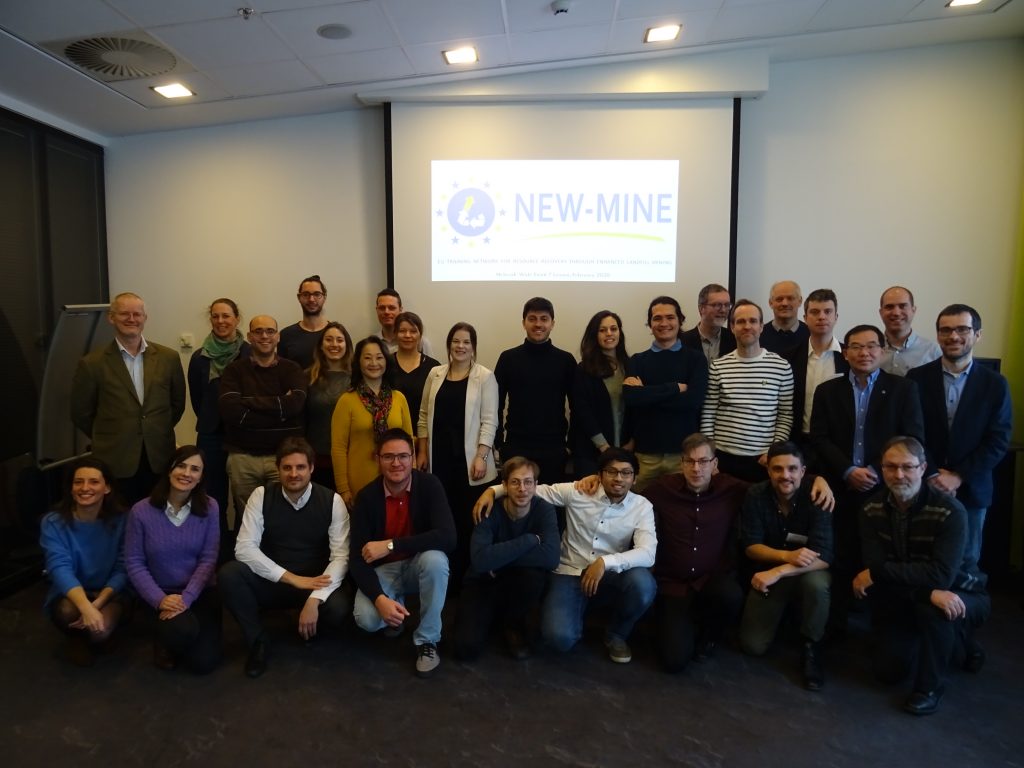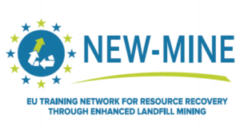The seventh network-wide event of MSCA ETN NEW-MINE took place on 5, 6 and 7 February 2020 in Leuven (Belgium).
On the first day of the NWE, the ESRs received two trainings. Various other PhD-students also attended the training sessions. Both trainings took place in the Park Inn Hotel in Leuven (Belgium):
- Scientific paper writing skills: “So, you want to write a scientific paper”. During the interactive training session, the following topics were discussed: The parts of a scientific paper; What are IF and h-index?; Getting published, and getting cited; Why do papers get rejected?; Getting published in Nature, Science, etc.; Technical writing – some basics; Technical writing – hyphens and dashes; Writing an abstract.

Training on scientific paper writing skills
- Training on MSCA Individual Fellowship (IF2020) proposal writing. In preparation of the upcoming call for MSCA IF (expected in spring 2020), a dedicated training session was organised in which the following topics were discussed: The elements of an MSCA Individual Fellowship proposal; Being realistic; What makes a good ‘1.Excellence section’; Who should gain from the knowledge transfer?; Choosing and describing the host research group; How to have the right 2. Impact; What are exploitation, dissemination and communication?; 3. Implementation and the Gantt chart; Risks and how to mitigate them.

Training on MSCA Individual Fellowship proposal writing
In parallel with the first training session, a rehearsal of the WP presentations for the ELFM-5 symposium of the next day was held. After the rehearsal, the ESRs processed the feedback from the project Management Support Team. Later that day, the ESRs organise their Researchers Council. In the evening, the consortium dinner was organised.
On the second day, on Thursday 6/02, the project closing symposium, the fifth symposium on Enhanced Landfill Mining, was organised. Approximately 70 participants, experts from the field of waste management and processing, listened carefully to the keynote speakers and engaged with the panelist in several enriching debates. NEW-MINE Coordinator, dr. ir. Peter Tom Jones, opened the symposium with his keynote on “10 years of ELFM: Status quaestionis” and linked landfills with the “Dark Side of the Circular Economy”. Next, Eddy Wille (OVAM & COCOON) presented “Dynamic landfill management” as a new paradigm. Yves Tielemans (Group Machiels) presented a case from practice “Landfill mining: horses for courses”, while Kate Spencer (University of London) warned about the risks of “Floods and landfills”.
After the coffee break, four ESRs from the four NEW-MINE work packages presented the main results achieved per WP:
- Juan Carlos Hernandez Parrodi: WP1 – Innovative landfill exploration and mechanical processing of waste excavated from landfills
- Yamid Gomez Rueda: WP2 – Thermal conversion of the Refuse Derived Fuel fraction
- Hugo Ignacio Lucas: WP3 – Upcycling of ashes and vitrified ashes, by-products of the gasification process of WP2
- Giovanna Sauve: WP4 – Multi-criteria assessment for landfill mining concepts and technologies
After the presentations, a short Q&A was organised with all participants. In the afternoon session, Fred Nguyen (ULiège) discussed “Cost-effective exploration methods for landfills” and presented results obtained in the RAWFILL project. Next, prof. Paul Bardos (r3 Environmental Technology Ltd) introduced the audience on how to apply “Brownfield Opportunity Matrix” to landfills. Finally, Claudia Neculau (SpaQue & RAWFILL) gave a visionary presentation “Towards a Green New Deal for landfill mining in Wallonia”. All presentations are available online on the symposium website. In preparation of the ELFM-5, the NEW-MINE project teamed up with the Detritus journal to publish a special issue on ELFM; all participants to ELFM-5 received a hard copy of the journal.

The NEW-MINE consortium group picture
Finally, on Friday 7/02, the NEW-MINE consortium gathered to review the project’s progress during the Technical Steering Committee (TSC) and Supervisory Board (SB). At the end of the SB, a brief session to explore future collaborations was held. After lunch, all participants were invited to join the visit to the nearby AB Inbev brewery.


